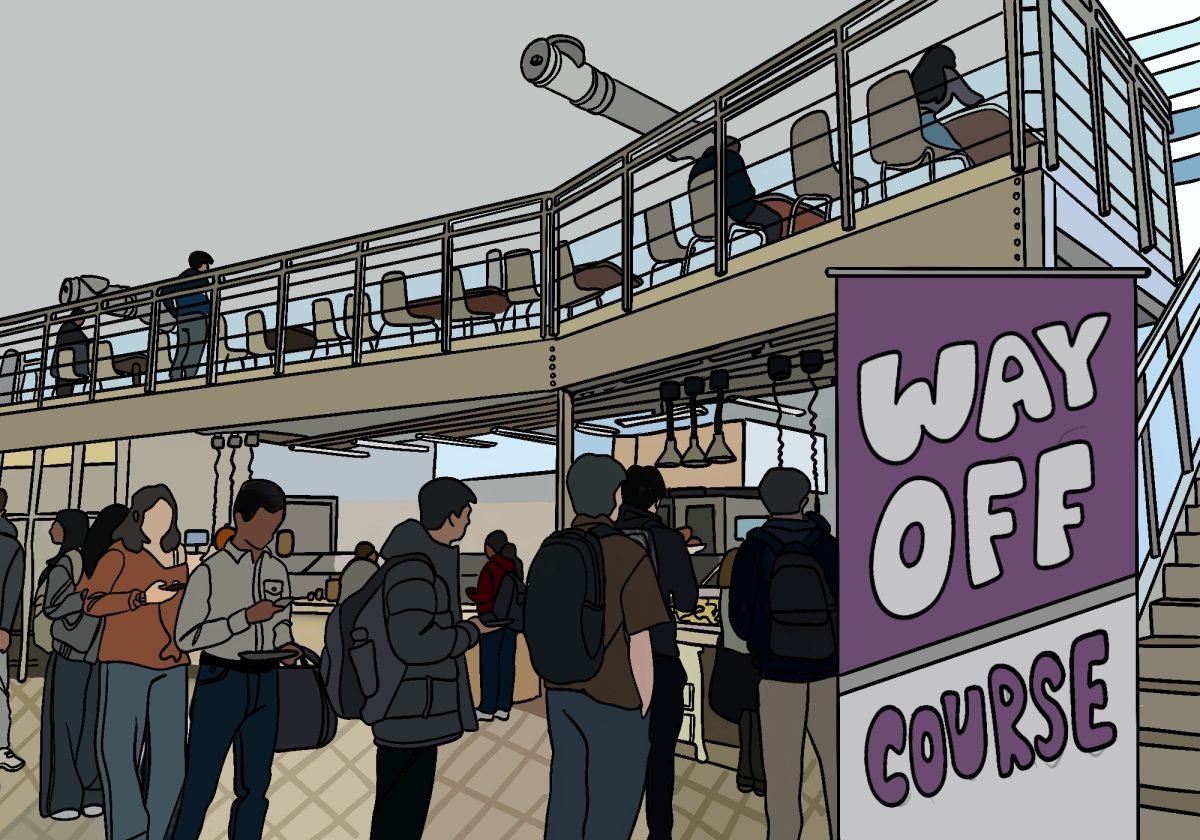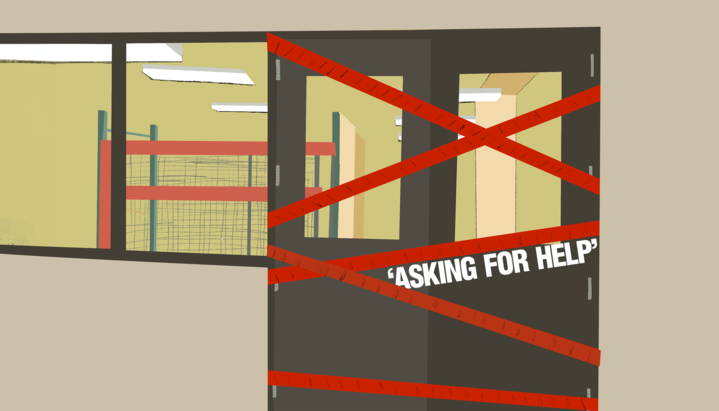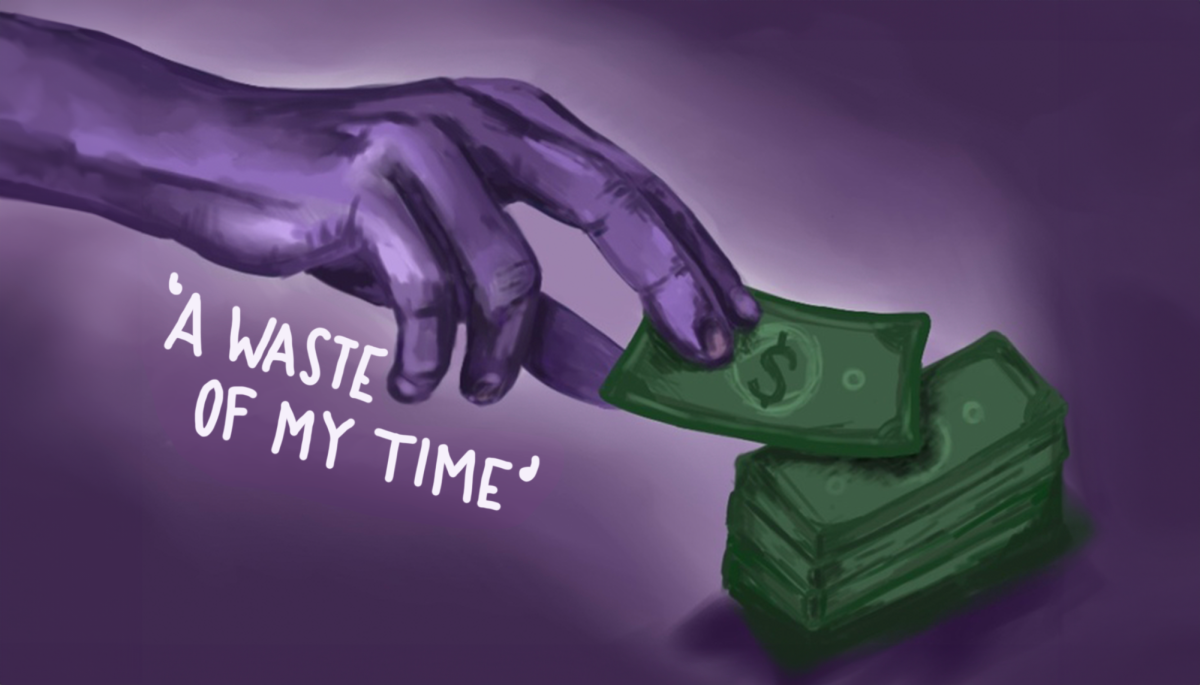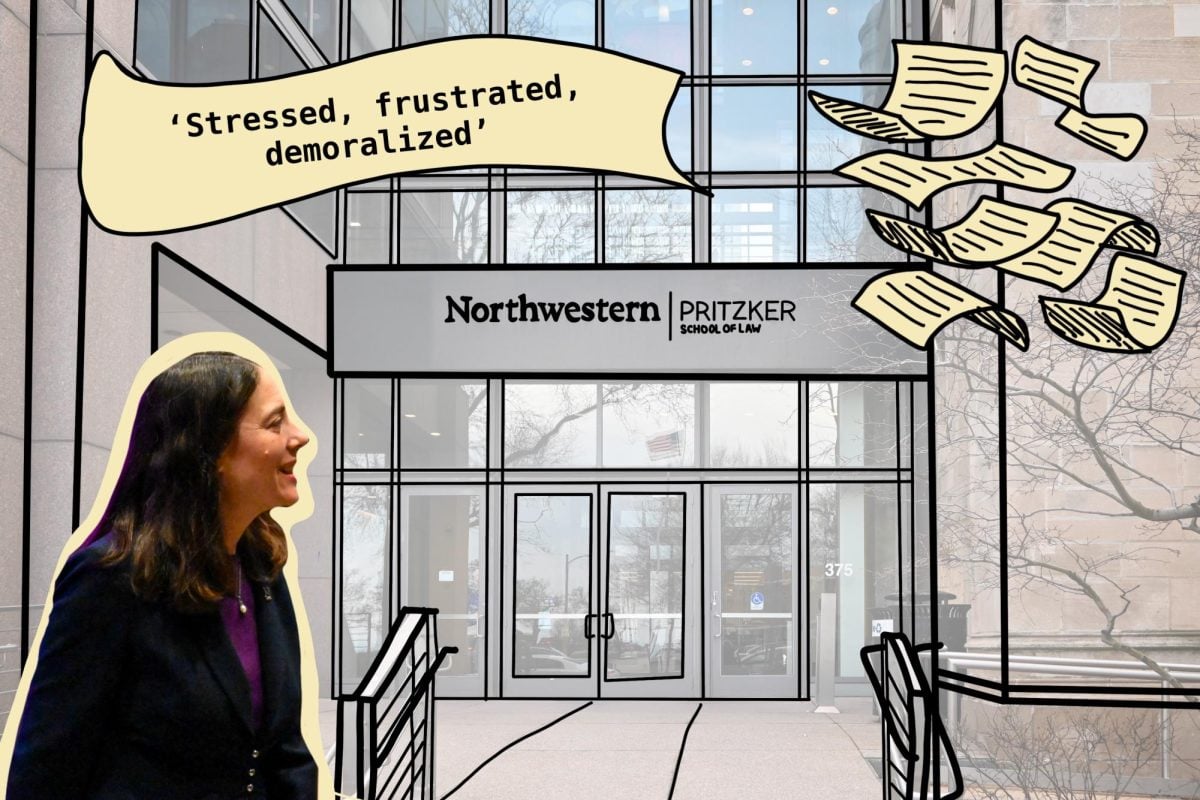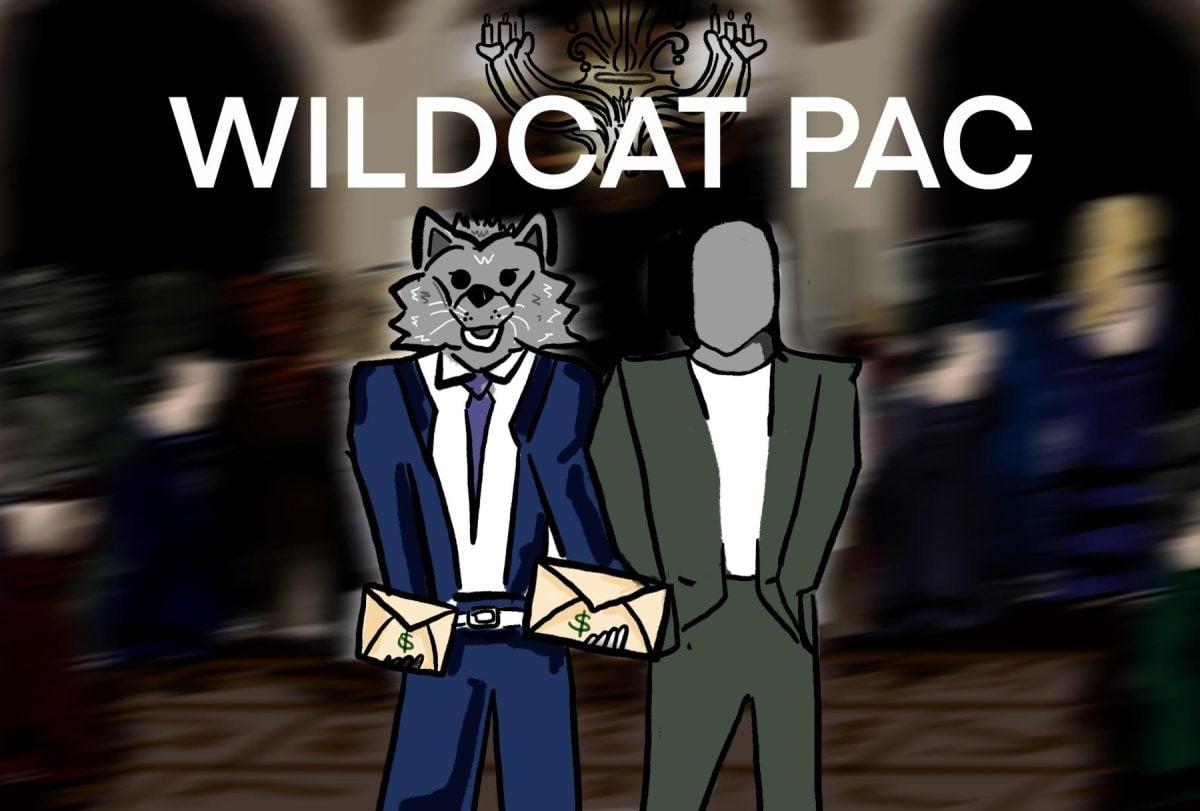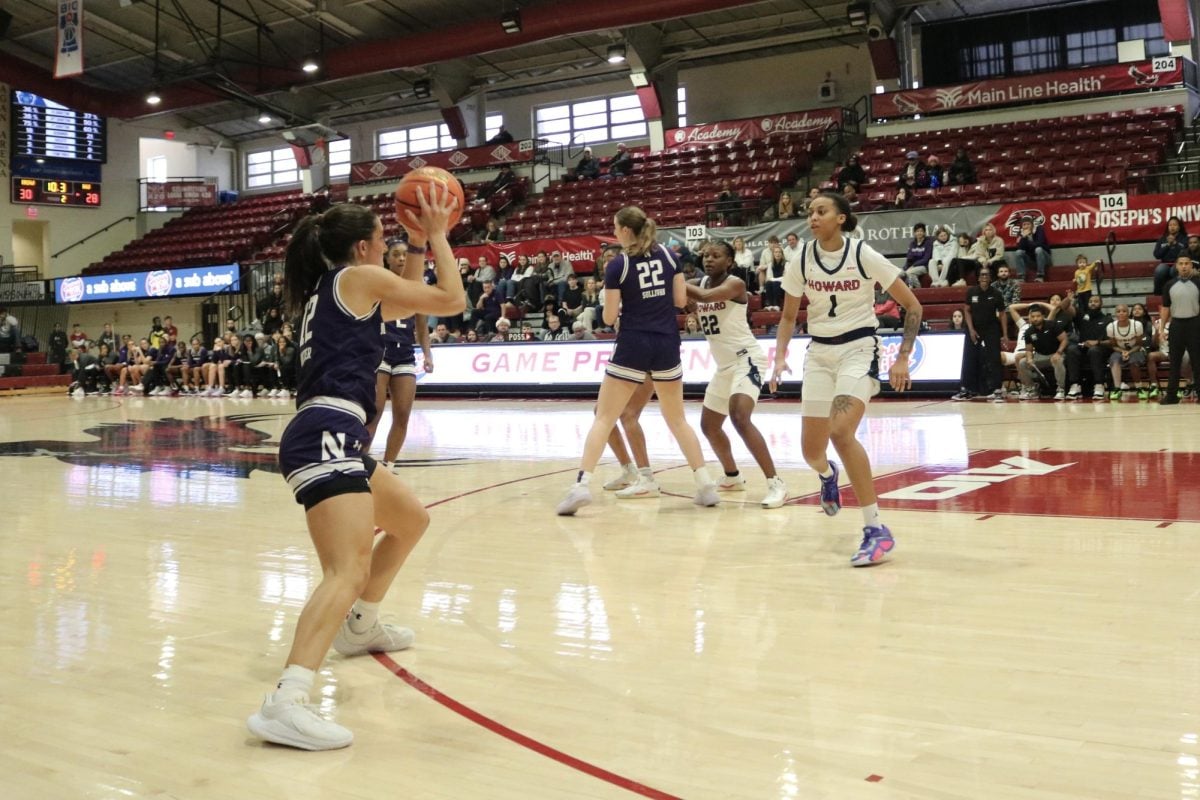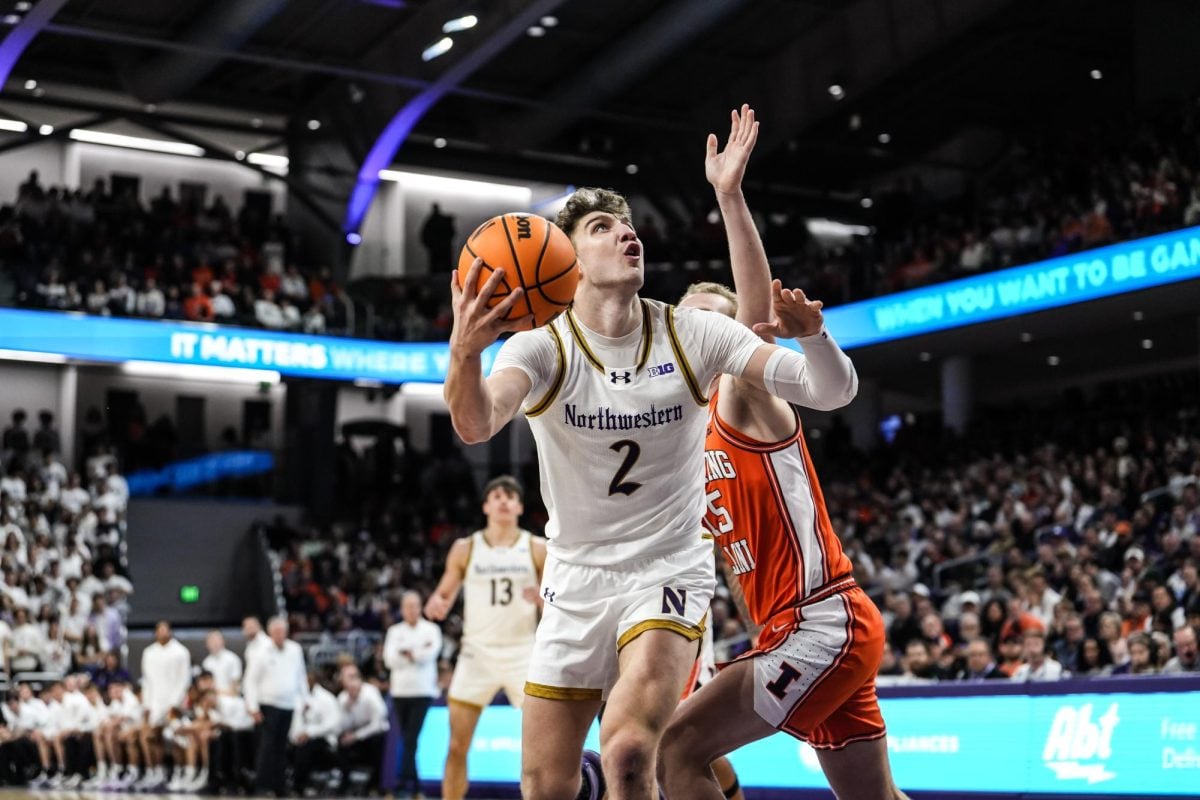Joe McKeown’s arms are crossed and he’s holding a clipboard in his right hand. His shoes are untied and his whitish-gray hair sticks out from the top of his black jumpsuit. His eyes ping-pong across the court as his defense slides to prevent passes from working their way around the 3-point line. Northwestern is in the midst of a four-game conference losing streak and is running through defensive sets as the Wildcats prepare to face in-state rival Illinois on a Thursday in early February. When a player doesn’t hedge out far enough against a screen to defend the wing in the matchup zone, McKeown’s trademark defense ‘Blizzard,’ he interjects: “Hold it, hold it, hold it, hold it! That hurt us against Wisconsin on Sunday, and we can’t let it happen tomorrow. Everyone on the line. If you want to play in March, you have to pay your dues. Full court and back sprint. Go!”
Here’s where we take a timeout: This is a coach with 550 career wins, no losing seasons and 17 NCAA Tournament appearances in two coaching stops before coming to NU. This is a school with a limited basketball tradition, a losing record for 11 straight seasons and six total appearances in the Big Dance. How did we get to this point, where an accomplished coach – not any coach, but Joe McKeown – ends up leading a non-contending school – not any school, but Northwestern – and telling them what it takes to play postseason basketball? There’s no quick reply to that question, but the long answer sheds light on McKeown, the man changing the culture of NU women’s basketball.
Before coming to Evanston, McKeown spent 19 years at George Washington, taking the school from bottom-feeder of the Atlantic 10 to perennial top-25 powerhouse and yearly Sweet 16 contender. He became so popular there that students chanted his name when he walked onto the court. Simply put, Joe McKeown was George Washington basketball.
Even though McKeown had originally planned to coach men, he didn’t think much about switching once he got entrenched in the women’s game. When attending a prominent basketball camp in the Pocono Mountains, McKeown talked to Jim Lynam, who was coaching the Philadelphia 76ers. It was a conversation that convinced him to stick with his career path. “He said to me, and I’ll always remember this because I had great respect for him,” McKeown recalls. “He said, ‘You know what, Joe? Women’s basketball is going to explode. There’s nothing wrong with what you’re doing. … Watch, this thing is going to grow.’ And he was right.”
The idea of moving to men’s basketball came up only once, after McKeown had been at GW for 13 years, when the school fired men’s coach Tom Penders. There was natural support at the university for McKeown to take the job, but he decided to stick with what he knew. McKeown also had opportunities to jump to the WNBA in 1997 and 1999, when the New York Liberty and the Washington Mystics came calling, but again McKeown stayed put.
McKeown didn’t want to leave GW unless it was on his own terms, for a perfect fit. NU matched both his family and his career aspirations. So, in 2008, at 52 years old, McKeown made an unprecedented career move that shocked many in the women’s college basketball world. He left the program he built from the ground up for a struggling program that hadn’t played in the postseason for more than a decade. He left a place that had everything he wanted and needed. That is, everything except for a secondary school with services for his autistic son, Joey, then 13 years old.
“When you’re a parent, you get caught in situations and you just try to do the best you can,” McKeown says. “You just ask, ‘What’s best for my family?’ That’s how we came to the decision to move here.”
Of course, McKeown is quick to point out there were basketball reasons for the decision too; NU is a school that plays in a power conference, offers an elite education, is located on Lake Michigan near a world-class city, has had exceptional success in women’s athletics, gets national exposure on the Big Ten Network and features an athletic director inspired to transform the dynamic of its sports program. McKeown says he saw NU’s “untapped potential.”
After just three seasons in Evanston, it looks like McKeown was right. The Cats had a combined 7-59 Big Ten record in the four seasons before McKeown stepped on campus. In the last two seasons, they’ve won a total of 13 conference games.
But you have to look beyond McKeown’s on-court success to understand what makes him tick. Even though it’s an oversimplification, it’s safe to say what’s most important to McKeown in life is family, basketball and Philadelphia. In that order.
“The thing I love about him,” says Don Perrelli, who was the last coach to take NU to the NCAA Tournament, in 1997, “(is that) he can take basketball and his family, and he can work both of those issues. He can put them both in perspective and keep them balanced, and that’s not an easy thing to do. He has the energy to do both, which I’m very, very impressed by.”
That’s why McKeown ended up at NU. That’s why he has been successful. And that’s why his story – the story of a down-to-earth, caring, passionate, patient basketball coach – is worth telling.
Built Philly tough
You can take McKeown out of Philadelphia, but you can’t take Philadelphia out of McKeown. Even though he is more than 30 years removed from living there, the city he calls home hasn’t left him, which is evident in his accent and his sarcastic sense of humor. It’s what players and coaches call his “Philly swagger.”
McKeown grew up in a humble, Irish-Catholic neighborhood in Northeast Philadelphia, the second of four children. Living in a rowhouse off Frankford Avenue in Mayfair, McKeown’s tight-knit family instilled in him a block mentality. “Coach is an old-school, Philly, Irish, rowhouse kind of guy,” NU associate head coach Ali Jaques says. “He’s really proud of where he’s come from.”
McKeown says he was “probably like most kids growing up in Philadelphia back in the ’60s,” spending time at local playgrounds and schoolyards. He would cut holes in the fingertips of his winter gloves to allow for touch on his jump shot. “You lived on a block and everybody had four, five, six kids. You just played ball, stick ball, football in the alley, basketball. You played wherever you could, and that just kept you out of trouble.” Playing street ball imbued McKeown with a certain toughness and a hard-nosed, blue-collar approach.
McKeown’s appreciation for X’s and O’s came from watching double-headers at The Palestra, which was home to the Big 5. As a youngster, he rode the subway with his brother to meet his father at “The Cathedral of College Basketball,” watching city foes duel on a nightly basis. “That, to me,” McKeown says, “was the greatest thing in the world. It was just unbelievable. Basketball was so important (in Philadelphia).” Witnessing rivalries like St. Joe’s-Villanova and watching big-time programs like Kentucky and North Carolina fueled McKeown’s passion for hoops. And after seeing the likes of Jack Ramsey and Chuck Daly pacing the sidelines of The Palestra, McKeown knew what he wanted to do for a career. “Just watching those legendary guys in the ’60s and ’70s, I really enjoyed that,” McKeown says, chuckling. “I figured it would be cool to be a college coach. Even before I was in high school, I felt that way.”
At Father Judge High School, McKeown played in the competitive Philadelphia Catholic League, but when his coach left in the middle of his senior year, the point guard’s chances of landing a scholarship with a prominent program took a hit. Instead of playing in the Big 5 like he wanted, McKeown opted to spend two years at a junior college, Mercer County (N.J.), hoping to come back home and play in the arena he grew up lauding.
But McKeown’s wishes to play in Philadelphia didn’t pan out. He eventually transferred to Kent State, and by the time he finished his college career, he had played fo
r four coaches in four years. “I guess I was a coach killer,” he jokes.
McKeown then spent a year at Kent State as a graduate assistant while earning his Master’s degree, which helped him land a job at Burlington County College (N.J.) for one season before eventually getting an assistant coaching offer from Oklahoma’s Maura McHugh. “That was a big break for me,” McKeown says. “I’ll be forever indebted to her.” Each of the three seasons McKeown was in Norman, Okla., the Sooners won at least 20 games.
By the age of 29, McKeown had a Division-I head coaching gig at New Mexico State. The Aggies went 23-7 in his first year and 26-3 in year two, reaching the NCAA Tournament both seasons. His quick success at New Mexico State put the wheels in motion for McKeown to move across the country and up the conference food chain to become head coach at GW, which went 9-19 the season before McKeown took over. Two years later, McKeown had the Colonials in the second round of the NCAA Tournament, and they missed the postseason just once in the next 17 seasons. During that time, he and his wife, Laura, had three children, Meghan, Joey and Ally.
Fatherly figure
When McKeown decided to leave behind everything in Washington, D.C., he didn’t move because it would make things easier on him. Quite the contrary, notes his daughter Meghan, who’s a freshman on the basketball team at NU: “At GW, we were used to winning every single game in the A-10. We were used to winning by at least 15. When you’re used to that and it gets taken away, it’s really hard. … But when you’re given a challenge of raising a son with autism, you have no other choice but to put him before you, and that’s really carried over to my dad’s life now.”
The school system in Fairfax, Va., where the McKeown family resided, didn’t offer the resources for Joey’s developmental needs. So when McKeown was looking for answers on how to improve his son’s educational opportunities, Chicago’s North Shore provided a perfect solution. As Meghan says, “Coming here, the people really want to help you, they really want to find what’s best for (Joey), which is very important when you’re dealing with children with special needs.” Joey first enrolled at Glencoe Middle School and is now at New Trier High School, where there’s a 47-member special education faculty.
McKeown’s office in McGaw Hall, behind the basketball court at Welsh-Ryan Arena, features several of Joey’s drawings. By all accounts, Joey, now 16, is a talented and intelligent boy who likes building Lego and Erector sets. He also has a powerful memory, and no story embodies that better than one Jaques, the associate head coach, recalls from her time at GW before coming to NU with McKeown. “I walked into the locker room when we were in the Sweet 16 at USC. And I remember Joey had written up on the board in marker the brackets from the last 10 women’s basketball tournaments. Like, the entire brackets from the last 10 tournaments. I was shocked. I was like, ‘Hey Joe. What are you doing?’ And he’s like, ‘Oh, nothing.’ For someone to be so gifted in so many ways, but for it to be hard to say ‘hi’ to someone, I don’t know the right word for that – it just kind of awakens you a little bit, to maybe realize how lucky you are to not have those challenges, but to see how amazing he is and see things a little bit differently.”
McKeown has an uncanny ability to keep his family life separate from basketball and he rarely lets them blend together. But it’s inevitable that sometimes they will, like earlier this year when Joey was hospitalized and McKeown couldn’t travel with the team to Western Kentucky, or when McKeown had to attend a four-hour meeting at New Trier and miss a practice. “It’s a daily thing. It doesn’t go away,” says Jaques, who lived with the McKeown family for a few weeks before finding a place to live in Evanston. “It’s a way of life.”
But that’s what makes everyone – Jaques, Meghan McKeown, other players on NU’s roster, athletic director Jim Phillips and opposing coaches who were interviewed for this story – respect McKeown’s priorities.
“Family is everything,” McKeown says. “It’s also handling adversity as a family, going through some ups and downs and knowing that you’re going to get through all these things together. To me, that’s more important than the street you live on or the parish you’re in or the city you’re in. Knowing that at the end of the day, that’s what you have: family.”
And McKeown doesn’t enforce that selectively for his own betterment. When current senior Beth Marshall’s father was battling cancer three years ago, McKeown told her to spend time with her father and not worry about summer practices. When Jaques’ father required open-heart surgery two years ago, McKeown told her to go and be with her father.
“In coaching, we get so obsessed and so completely tunnel-visioned with 18- to 22-year-olds and trying to figure out how to put the ball in the basket that we forget the bigger picture of things,” Jaques says. “But Coach definitely understands balance. He understands what’s important and what can take a back seat.”
That idea has carried over into everything McKeown does, Jaques says. “He takes time for everyone – the most fortunate, the least fortunate, from the most important on paper to somebody who might be driving a shuttle bus to get our players here. He just takes time for everyone.”
Building a team that’s like a family is a coaching cliché, but McKeown’s background and caring nature epitomize that idea. “He cares for every single one of his players like they’re his daughter,” Meghan says. “I happen to be his daughter, but the fact is that he treats every single kid that way.”
Other NU players back up Meghan’s story. “When we came home from one of our games a couple weeks ago, it had snowed pretty bad,” sophomore forward Kendall Hackney recounts. “Coach McKeown was out (in the parking lot), wiping snow off from our cars. And I had never seen him do that before. I was like, ‘Coach McKeown, that is so sweet of you.’ And he wiped off Meghan’s car, and I was like, ‘Oh, a father!’ … It was just really nice that he was helping us all wipe off the snow from our cars and making sure everybody had a ride, so it was kind of like a fatherly figure moment for him, showing how much he cares about us.”
Changing the culture
Certainly the family concerns helped push McKeown to Evanston, but Jaques says there was more to the decision: “It’s not fair to say the only reason he came here was for his family. He came here because he’s got something left and he wants to prove it. … He’s been to an Elite Eight. There’s part of him that’s itching for more.”
When McKeown first considered leaving GW in April 2008, he called a few longtime coaching friends for advice on leaving at a time in his career arc when most coaches stay put. He spoke with two coaches who left schools when they were in their 50s: Texas A&M’s Gary Blair, who left Arkansas, and Ohio State’s Jim Foster, who left Vanderbilt. Neither was startled about McKeown pondering a move, given their knowledge of his family background, but it caught NU athletic director Jim Phillips off guard.
“Initially I was surprised,” Phillips recalls. “I was thrilled that he was interested, and we had a nice a conversation over the phone first before I met him in person. He initiated that first phone call, so I knew that there had to be some interest if I got a call from him. … But you never think a guy like that, who has been at a place for so long, would kind of engage in that kind of conversation.”
After talking on the phone for much of April, Phillips met McKeown at the Hilton in downtown Chicago early that May for a sit-down interview.
“It was really an impressive meeting. You know if there’s a connection, and instantly we felt like this would be a terrific fit,” Phillips says. “When you look at the important things that we were looking for in a coach … You co
uld tell immediately when you looked at the checklist we were looking for, for NU, he filled all the boxes.”
At the time McKeown took over each program, GW and NU were in similar positions. Both were small private schools in conferences with big state universities, both emphasized academics, both were located near major cities, and both programs were in shambles when McKeown took the reins. So in many respects, the instant turnaround at GW provided a blueprint for doing the same at NU. But hardly anyone expected the Cats to post back-to-back winning seasons and make consecutive postseason appearances this fast.
“I don’t ever believe there’s quick fixes in anything you do. I think you have to build it to last over a period of time,” Phillips says. McKeown would be “the first one to tell you that he’s not completely pleased with where we’re at right now. I keep telling him, ‘Joe, if you’d have told me three years ago this is where it would be, I would have been doing jumping jacks with excitement.'”
McKeown’s first challenge was convincing the players already at NU, who went 5-26 the year before he arrived, that they could win if they bought into his system. McKeown held “Competitive Wednesdays,” where he split his roster into two groups, purple and white, and essentially had the team scrimmage, a rare in-season drill.
“More than anything, he taught us how to become competitive,” senior All-American candidate Amy Jaeschke says. “When you lose a lot, you don’t have the confidence to win. You want to believe that you’re going to beat every team you play, but it’s kind of hard to think that way when you’re getting blown out by 30 points every single night. That had a lot to do with it, just changing the mindset of the program.”
The best coaches have an ability to assess their players’ strengths and weaknesses and put them in a position to be successful. When you consider that McKeown recruited just one of the team’s top six scorers on this year’s squad, everything starts to come into perspective. He knows how to coach, and as Phillips says, “There’s no debating that he’s going to be in the Women’s College Basketball Hall of Fame. He just is.”
As with every college sport, recruiting is the lifeblood of a women’s basketball program. Convincing 18-year-olds a school that was once a basketball graveyard will be competitive is a daunting task, but McKeown already added two top-100 players and has two more in the class of 2011, according to ESPN HoopGurlz.
“You have to sell: ‘Hey look, this is who we are and this is what we’ve done, we’ve been to almost 20 NCAA Tournaments. You’ve got to believe that this is going to happen again, believe in what we’re doing here,'” McKeown says.
For now, he doesn’t worry about his team’s record. He knows building a program is a day-by-day process, where you have to take small steps to reach the bigger goal.
“It’s about putting foundations in place so you’re trying to build a program instead of having a winning season,” McKeown says. “That way, year after year, you have things in place so that when a player walks into this program they know what’s expected of them in terms of work ethic, the level of commitment. … If you can build the foundation, the winning takes care of itself.”
But as McKeown points out, he doesn’t handle losing very well. In fact, when he was at GW, Meghan had a running bet with her mom that by four minutes into the game McKeown’s sport coat would be off, thrown behind the bench with intensity. “As the years have gone by, his jacket has stayed on by the 16-minute mark,” Meghan says. “But there was a time where it was always off. When your coach is that passionate about winning and puts everything on the line, it’s important because if he’s willing to live and die for you, theoretically speaking, then you should be the same for him.”
With McKeown, the pieces are in place for NU women’s basketball to finally return to March Madness. Perrelli, who visited campus in late February for a halftime ceremony honoring the 1990 Big Ten Championship team, recognizes the future of NU basketball. “This is a program on the move,” says Perrelli, who guided the Cats to five NCAA Tournament appearances in 15 years while recording 251 wins. “This is a guy who knows how to win, and he will win here. Without question he will surpass what we did here.”
As McKeown says, “It’s important for us not to look back and second-guess anything.” But nobody has a reason to do that. Joey has benefitted from the move; Meghan adjusted after switching high schools following her sophomore year; McKeown has NU in great shape, on the brink of another postseason appearance.
After all, McKeown’s family and NU are a match made in hEvanston.
